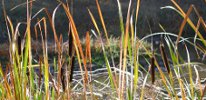
Training
Targeted/Prescribed (Rotational / Deferral) Livestock Grazing for Meeting Conservation Goals
This is the twice-a-year meeting of the Central Coast Rangeland Coalition. The goal of this meeting is to raise awareness of how planned, targeted, rotational/deferral grazing practices (particular strategies and methods) can be used to meet specific conservation objectives.
COST: $30.00
Payable by check to Elkhorn Slough Foundation
Payable by credit card (online)
REGISTRATION FOR THIS PROGRAM IS CLOSED
Instructor Information
Ms. Erin Campbell-Craven
CCRC Scholar
California Polytechnic State University, San Luis Obispo, Animal Science Department
Dr. Brian Dietterick
Director
Cal Poly Swanton Pacific Ranch
Justin Fields
Fifth-generation cattle rancher
Dr. Marc Horney
Associate Professor
California Polytechnic State University, San Luis Obispo, Animal Science Department
Mr. Aaron Lazanoff
Beef Operations Manager
California Polytechnic State University, San Luis Obispo, Animal Science Department
Dr. John Perrine
Associate Professor
California Polytechnic State University, San Luis Obispo, Biological Sciences Department
Ms. Andrée Soares
President
Star Creek Land Stewards, Inc
Stuart Weiss
Chief Scientist
Creekside Center for Earth Observation
Contact
Grey Hayes
grey@elkhornslough.org
(831) 274-8700
Sponsors
Description
See also: Central Coast Rangeland Coalition, Sustainable Human Systems
Description
Grazing is becoming increasingly recognized as an effective and efficient way to meet a wide variety of conservation goals at various scales. This workshop will bring ranchers, other land managers, and biologists together to discuss how to use grazing to aid in the conservation of natural resources from water quality to species of conservation concern. Worksho participants will explore a broad range of grazing practices that are or could be used to help meet conservation targets in central coast rangelands. Discussions will include how these strategies work to meet conservation goals, how to implement strategies in a variety of different rangeland scenarios, and how these strategies fit into livestock operations on a broader scale. The discussions generated will facilitate improved working relationships between the many stakeholder groups operating on rangelands, benefit rangeland productivity, and improve conservation outcomes.
Goal: To increase participant awareness and familiarity with a variety of grazing practices (particular strategies and methods) can be used to meet specific conservation objectives.
Objectives:
- Identify specific practices under the broader topic of targeted/prescribed and rotational/ deferral grazing that could be used to meet specific conservation objectives. Examples of conservation objectives covered will include management oriented toward watershed function and special status species.
- Consider how different grazing practices or strategies may be used to achieve conservation objectives, and the nuts and bolts of implementing these various practices.
- Identify tradeoffs in management outcomes associated with different grazing strategies discussed.
Meeting Format
This workshop will consist of indoor lectures and a panel discussion in the morning and an afternoon field excursion to sites featuring rangeland issues with riparian restoration and grazing for special status species. Participants will carpool between the morning indoor session and the afternoon field sites. There will also be small group discussions interspersed throughout the day to give participants an opportunity to share their expertise and learn from the diverse experiences of other meeting participants.
Registration Information
Please note- your registration will not be final until we receive and acknowledge payment of $30. You can pay online at the link provided after you register, or you can mail a check made out to Elkhorn Slough Foundation addressed to: Grey Hayes, c/o ESF, 1700 Elkhorn Road, Watsonville, CA 95076
Please register only yourself- no third party registration is allowed, as this frequently causes all sorts of problems. Registration deadline is April 12, 5 p.m. If you cancel, we can refund payment minus $10 processing fee before that deadline, but cannot refund anything if you cancel after that date. We reserve the right to cancel the workshop before April 14, in which case we will provide full refund. If you sign up, please show up- repeated failure to provide timely notification of inability to attend can jeopardize future registration opportunities.
Documents and Publications
Contact List
We encourage participants to download the contact list to assist with arranging a rideshare or to get in contact with someone you met at the
workshop. Those interested in sharing a ride to the event are marked on the contact list.
| DOCUMENT | AUTHOR / SOURCE |
|---|---|
| WORKSHOP MATERIALS | |
| CCRC Spring 2017 Agenda PDF, 40KB |
Lewis Reed CCRC March 2017 |
| Targeted and Prescribed Grazing on California's Central Coast PDF, 2MB |
Erin Cambell-Craven, CAFES Graduate Student California Polytechnic State University 2017 |
| PEER-REVIEWED PUBLICATIONS | |
| Cars, cows, and checkerspot butterflies: nitrogen deposition and management of nutrient-poor grasslands for a threatened species. PDF, 2.8MB |
Weiss, S.B. Conservation Biology 13(6): 1476-1486 1999 |
| Grazing Systems Management: Achieving management goals by balancing livestock grazing with time and space. Understanding Working Rangelands PDF, 932KB |
Sheila Barry, et al UC Cooperative Extension 2015 |
| Nitrogen critical loads and management alternatives for N-impacted ecosystems in California PDF, 2.9MB |
M.E. Fenn,
E.B. Allen,
S.B. Weiss,
S. Jovan,
L.H. Geiser,
G.S. Tonnesen,
R.F. Johnson,
L.E. Rao,
B.S. Gimeno,
F. Yuan,
T. Meixner, and
A. Bytnerowicz Journal of Environmental Management, v. 91, pp. 2404-2423 2010 |
Links
Blog: Ecological Benefits of Ranching
http://ucfoodobserver.com/2017/01/23/ranching-cattle-in-california/
California Wildlife Habitat Relationships
https://www.wildlife.ca.gov/Data/CWHR
Santa Clara Valley Habitat Agency
http://scv-habitatagency.org/
Wildlife Habitat Relationship Database: American Badger Life History Account
https://nrm.dfg.ca.gov/FileHandler.ashx?DocumentID=2597
Questions and Answers
Submit a question on this subject and we'll provide an answer. coastaltraining@elkhornsloughctp.org




